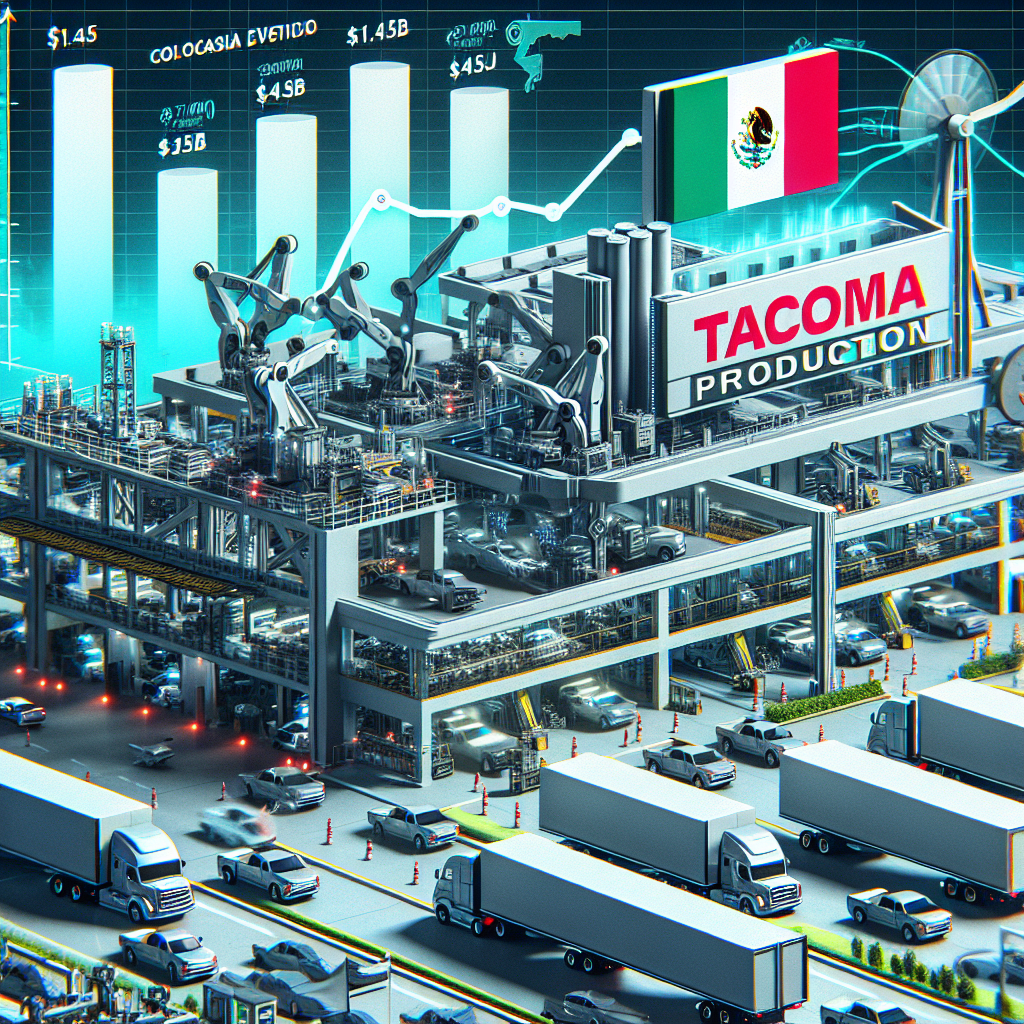“Driving Innovation: Toyota’s $1.45B Boost to Tacoma Production in Mexico”
Introduction
Toyota has announced a significant investment of $1.45 billion in its Mexican operations to bolster the production of its popular Tacoma pickup truck. This strategic move underscores Toyota’s commitment to strengthening its manufacturing capabilities in North America and meeting the growing demand for its vehicles. The investment will be directed towards expanding and upgrading the company’s facilities in Mexico, enhancing production efficiency, and incorporating advanced technologies. This initiative is expected to create numerous job opportunities and further solidify Toyota’s position in the competitive automotive market.
Toyota’s Strategic Investment in Mexico: A $1.45B Boost for Tacoma Production
Toyota’s recent announcement to invest $1.45 billion in its Mexican operations marks a significant step in the company’s strategic efforts to enhance the production of its popular Tacoma pickup truck. This substantial investment underscores Toyota’s commitment to strengthening its manufacturing capabilities in North America, particularly in response to the growing demand for pickup trucks in the region. By channeling resources into its Mexican facilities, Toyota aims to optimize its production processes, improve efficiency, and ultimately increase the output of the Tacoma model, which has consistently been a top performer in the midsize pickup segment.
The decision to invest in Mexico is not only a testament to the country’s strategic importance in Toyota’s global manufacturing network but also a reflection of the broader trends in the automotive industry. Mexico has long been a hub for automotive production, offering a skilled workforce, competitive labor costs, and favorable trade agreements that facilitate the export of vehicles to key markets, including the United States. By expanding its operations in Mexico, Toyota is positioning itself to better serve the North American market while also leveraging the advantages that the region offers.
Moreover, this investment aligns with Toyota’s broader strategy of localizing production to meet regional demand more effectively. As consumer preferences continue to shift towards larger vehicles, particularly in the United States, the demand for pickup trucks like the Tacoma has surged. By increasing production capacity in Mexico, Toyota can ensure a steady supply of vehicles to meet this demand, thereby maintaining its competitive edge in the market. This move also allows Toyota to mitigate potential disruptions in its supply chain, which have become increasingly important considerations in the wake of recent global challenges.
In addition to boosting production capacity, Toyota’s investment will also focus on incorporating advanced manufacturing technologies and sustainable practices into its Mexican operations. This aligns with the company’s commitment to reducing its environmental footprint and promoting sustainability across its global operations. By integrating cutting-edge technologies, Toyota aims to enhance the efficiency of its production processes while minimizing waste and energy consumption. This not only supports Toyota’s environmental goals but also contributes to the overall competitiveness of its manufacturing operations.
Furthermore, the investment is expected to have a positive impact on the local economy, creating job opportunities and fostering economic growth in the region. By expanding its operations, Toyota will generate employment for thousands of workers, both directly and indirectly, through its supply chain. This will not only benefit the local communities but also strengthen the economic ties between Mexico and Toyota, reinforcing the company’s long-term commitment to the region.
In conclusion, Toyota’s $1.45 billion investment in Mexico represents a strategic move to enhance its production capabilities for the Tacoma pickup truck, while also aligning with broader industry trends and sustainability goals. By expanding its operations in Mexico, Toyota is well-positioned to meet the growing demand for pickup trucks in North America, while also contributing to the local economy and promoting sustainable manufacturing practices. This investment underscores Toyota’s commitment to maintaining its leadership position in the automotive industry and its dedication to meeting the evolving needs of its customers. As the company continues to navigate the dynamic landscape of the automotive market, such strategic investments will be crucial in ensuring its continued success and growth.
Economic Impact of Toyota’s $1.45B Investment in Mexican Manufacturing
Toyota’s recent decision to invest $1.45 billion in its Mexican manufacturing facilities marks a significant development in the automotive industry, with far-reaching economic implications. This substantial investment is primarily aimed at enhancing the production of the Tacoma pickup truck, a model that has consistently demonstrated strong demand in the North American market. By channeling resources into its Mexican operations, Toyota not only underscores its commitment to meeting consumer needs but also highlights the strategic importance of Mexico in its global manufacturing network.
The infusion of capital into the Mexican facilities is expected to bolster the local economy significantly. With the expansion of production capabilities, there will be a corresponding increase in job opportunities, both directly within the plant and indirectly through the supply chain. This development is poised to create thousands of new jobs, thereby providing a substantial boost to the local labor market. Moreover, the investment is likely to stimulate ancillary industries, such as logistics, parts suppliers, and service providers, further amplifying its economic impact.
In addition to job creation, Toyota’s investment is anticipated to enhance the skill set of the local workforce. The introduction of advanced manufacturing technologies and processes will necessitate comprehensive training programs, equipping employees with valuable skills that are transferable across various sectors. This upskilling initiative not only benefits the individuals directly involved but also contributes to the broader economic development of the region by fostering a more skilled and adaptable workforce.
Furthermore, Toyota’s commitment to expanding its Mexican operations reflects the broader trend of globalization in the automotive industry. By leveraging Mexico’s strategic location and trade agreements, Toyota can optimize its supply chain and reduce production costs. This strategic positioning allows the company to remain competitive in a rapidly evolving market, where efficiency and cost-effectiveness are paramount. Additionally, the investment aligns with Toyota’s sustainability goals, as the company continues to innovate and implement environmentally friendly manufacturing practices.
The economic impact of Toyota’s investment extends beyond the immediate benefits to the local economy. By strengthening its manufacturing base in Mexico, Toyota enhances its ability to respond to fluctuations in market demand and potential disruptions in the global supply chain. This increased resilience is crucial in an era marked by geopolitical uncertainties and shifting trade dynamics. Consequently, Toyota’s investment not only fortifies its position in the North American market but also contributes to the stability and sustainability of its global operations.
Moreover, the investment serves as a testament to the strong economic ties between Japan and Mexico. It underscores the mutual benefits derived from international collaboration and trade, highlighting the importance of fostering robust economic partnerships. As Toyota continues to expand its presence in Mexico, it sets a precedent for other multinational corporations, encouraging further foreign direct investment in the region.
In conclusion, Toyota’s $1.45 billion investment in Mexican manufacturing facilities represents a strategic move with significant economic implications. By enhancing Tacoma production capabilities, the company not only addresses consumer demand but also contributes to job creation, workforce development, and regional economic growth. This investment exemplifies the interconnectedness of global markets and the importance of strategic positioning in maintaining competitiveness. As Toyota continues to innovate and expand, its commitment to Mexico serves as a model for sustainable and mutually beneficial international collaboration.
Enhancing Tacoma Production: How Toyota’s Investment Transforms the Automotive Landscape
Toyota’s recent decision to invest $1.45 billion in its Mexican operations marks a significant milestone in the automotive industry, particularly in the production of the popular Tacoma model. This substantial investment underscores Toyota’s commitment to enhancing its manufacturing capabilities and meeting the growing demand for mid-size pickup trucks. As the automotive landscape continues to evolve, this strategic move not only strengthens Toyota’s position in the market but also highlights the broader implications for the industry as a whole.
The investment is primarily directed towards Toyota’s plant in Guanajuato, Mexico, which has been a pivotal site for the production of the Tacoma. By channeling resources into this facility, Toyota aims to increase production capacity, improve operational efficiency, and integrate advanced manufacturing technologies. This initiative is expected to create approximately 1,000 new jobs, thereby contributing to the local economy and fostering a skilled workforce. Moreover, the expansion aligns with Toyota’s global strategy to optimize its production network and ensure a more agile response to market demands.
In recent years, the demand for pickup trucks, particularly in North America, has surged. The Tacoma, known for its durability and versatility, has consistently been a top choice among consumers. By enhancing production capabilities in Mexico, Toyota is well-positioned to capitalize on this trend and solidify its leadership in the segment. Furthermore, this investment reflects Toyota’s confidence in the Mexican manufacturing sector, which has become an integral part of the company’s global supply chain.
Transitioning to the broader implications of this investment, it is essential to consider the impact on the competitive landscape of the automotive industry. As manufacturers strive to meet consumer preferences and regulatory requirements, investments in production facilities are crucial for maintaining a competitive edge. Toyota’s move may prompt other automakers to reevaluate their strategies and consider similar investments to bolster their market positions. This could lead to a ripple effect, driving innovation and efficiency across the industry.
Additionally, Toyota’s investment in Mexico highlights the importance of strategic geographic positioning in the automotive sector. With its proximity to the United States, Mexico offers logistical advantages that facilitate the efficient distribution of vehicles to key markets. This geographic advantage, coupled with favorable trade agreements, makes Mexico an attractive location for automotive manufacturing. As a result, Toyota’s investment not only enhances its production capabilities but also reinforces the significance of Mexico as a hub for automotive innovation and production.
In conclusion, Toyota’s $1.45 billion investment in Mexico represents a transformative step in the company’s efforts to enhance Tacoma production and adapt to the evolving automotive landscape. By expanding its manufacturing capabilities, Toyota is poised to meet the increasing demand for mid-size pickup trucks while simultaneously contributing to the local economy and workforce development. This strategic move underscores the importance of geographic positioning and competitive agility in the automotive industry. As the sector continues to evolve, investments like these will play a crucial role in shaping the future of automotive manufacturing and ensuring that companies remain at the forefront of innovation and consumer satisfaction.
The Role of Mexico in Toyota’s Global Production Strategy

Toyota’s recent decision to invest $1.45 billion in Mexico to enhance Tacoma production underscores the strategic importance of the country in the automaker’s global production strategy. This substantial investment is not merely a financial commitment but a testament to Mexico’s growing role as a pivotal hub in Toyota’s manufacturing network. As the automotive industry continues to evolve, driven by technological advancements and shifting consumer preferences, Toyota’s focus on Mexico highlights the country’s advantageous position in the global market.
One of the primary reasons for Toyota’s investment in Mexico is the country’s strategic geographic location. Situated between North and South America, Mexico serves as an ideal gateway for Toyota to efficiently distribute vehicles across the continent. This geographical advantage is complemented by Mexico’s extensive network of free trade agreements, which facilitate smoother and more cost-effective export processes. By enhancing production capabilities in Mexico, Toyota can leverage these agreements to expand its market reach and strengthen its competitive edge.
Moreover, Mexico’s skilled labor force is another critical factor in Toyota’s decision to bolster its production facilities in the region. The country has a long-standing tradition of automotive manufacturing, with a workforce that is both experienced and adaptable to the demands of modern production techniques. This expertise is invaluable to Toyota as it seeks to maintain high standards of quality and efficiency in its manufacturing processes. By investing in local talent and infrastructure, Toyota not only enhances its production capabilities but also contributes to the economic development of the region.
In addition to these logistical and human resource advantages, Mexico offers a favorable economic environment for foreign investment. The Mexican government has implemented policies that encourage foreign companies to establish and expand their operations within the country. These policies include tax incentives, streamlined regulatory processes, and support for research and development initiatives. Such a conducive business climate aligns with Toyota’s long-term strategic goals, allowing the company to optimize its operations and achieve sustainable growth.
Furthermore, Toyota’s investment in Mexico is indicative of a broader trend within the automotive industry, where manufacturers are increasingly seeking to diversify their production bases. By expanding its presence in Mexico, Toyota reduces its reliance on any single market or production facility, thereby enhancing its resilience to global economic fluctuations and supply chain disruptions. This diversification strategy is particularly pertinent in the current global context, where geopolitical tensions and trade uncertainties pose significant challenges to multinational corporations.
As Toyota enhances its Tacoma production in Mexico, it also underscores the importance of innovation and sustainability in its global production strategy. The investment is expected to incorporate advanced manufacturing technologies and environmentally friendly practices, aligning with Toyota’s commitment to reducing its carbon footprint and promoting sustainable mobility solutions. By integrating these elements into its Mexican operations, Toyota not only meets the growing demand for eco-friendly vehicles but also sets a benchmark for the industry in terms of sustainable manufacturing practices.
In conclusion, Toyota’s $1.45 billion investment in Mexico to enhance Tacoma production is a strategic move that reflects the country’s integral role in the automaker’s global production strategy. Through this investment, Toyota capitalizes on Mexico’s geographic advantages, skilled labor force, favorable economic environment, and commitment to innovation and sustainability. As the automotive industry continues to navigate a rapidly changing landscape, Mexico’s significance in Toyota’s production network is poised to grow, reinforcing the country’s status as a key player in the global automotive arena.
Toyota’s Commitment to Innovation: A Closer Look at the $1.45B Investment
Toyota’s recent announcement of a $1.45 billion investment in its Mexican operations marks a significant step in the company’s ongoing commitment to innovation and expansion. This substantial financial commitment is primarily aimed at enhancing the production capabilities of the Tacoma pickup truck, a model that has consistently been a strong performer in the North American market. By channeling resources into its Mexican facilities, Toyota is not only reinforcing its manufacturing prowess but also strategically positioning itself to meet the growing demand for midsize trucks.
The decision to invest in Mexico is a testament to the country’s strategic importance in Toyota’s global manufacturing network. Mexico’s proximity to the United States, combined with its skilled workforce and favorable trade agreements, makes it an ideal location for automotive production. This investment will likely lead to the creation of numerous jobs, both directly within the plant and indirectly through the supply chain, thereby contributing to the local economy. Moreover, it underscores Toyota’s confidence in Mexico’s ability to deliver high-quality vehicles that meet the rigorous standards expected by consumers.
In addition to boosting production capacity, this investment is expected to incorporate advanced manufacturing technologies that align with Toyota’s commitment to sustainability and efficiency. The integration of cutting-edge technologies will not only enhance the quality and reliability of the Tacoma but also reduce the environmental impact of its production processes. By adopting more sustainable practices, Toyota is demonstrating its dedication to reducing its carbon footprint and promoting environmental stewardship, which are increasingly important considerations for consumers and stakeholders alike.
Furthermore, this investment reflects Toyota’s broader strategy of maintaining a diverse and resilient supply chain. By expanding its production capabilities in Mexico, Toyota is mitigating potential risks associated with over-reliance on a single geographic region. This diversification is particularly pertinent in the context of recent global supply chain disruptions, which have highlighted the vulnerabilities inherent in concentrated manufacturing hubs. By spreading its production across multiple locations, Toyota is better equipped to navigate unforeseen challenges and ensure a steady supply of vehicles to the market.
The enhancement of Tacoma production in Mexico also aligns with Toyota’s focus on meeting the evolving preferences of consumers. The midsize pickup truck segment has seen a surge in popularity, driven by a combination of lifestyle trends and practical needs. Consumers are increasingly seeking vehicles that offer a balance of utility, comfort, and fuel efficiency, and the Tacoma is well-positioned to meet these demands. By investing in its production, Toyota is ensuring that it can continue to deliver a product that resonates with its customer base and maintains its competitive edge in the market.
In conclusion, Toyota’s $1.45 billion investment in Mexico represents a multifaceted approach to strengthening its position in the automotive industry. By enhancing Tacoma production capabilities, embracing advanced technologies, and diversifying its supply chain, Toyota is not only addressing current market demands but also laying the groundwork for future growth. This strategic move underscores Toyota’s commitment to innovation, sustainability, and resilience, ensuring that it remains a leader in the ever-evolving automotive landscape. As the company continues to adapt to changing market dynamics, this investment serves as a clear indication of its dedication to delivering high-quality vehicles that meet the needs of consumers worldwide.
Workforce Implications of Toyota’s Expansion in Mexico
Toyota’s recent announcement to invest $1.45 billion in its Mexican operations marks a significant development in the automotive industry, particularly concerning the production of the popular Tacoma model. This substantial investment is poised to have far-reaching implications for the workforce in Mexico, as well as for the broader economic landscape of the region. As the automotive giant seeks to enhance its production capabilities, the ripple effects of this expansion are expected to be felt across various sectors.
To begin with, the infusion of capital into Toyota’s Mexican facilities is anticipated to create a substantial number of jobs, both directly and indirectly. The expansion will likely necessitate the hiring of additional workers to manage increased production volumes, thereby providing a boost to local employment. This is particularly significant in a country where the automotive industry plays a crucial role in the economy. By creating new job opportunities, Toyota’s investment is expected to contribute to reducing unemployment rates and improving the standard of living for many families in the region.
Moreover, the expansion is likely to stimulate growth in related industries, such as parts suppliers and logistics companies. As production ramps up, the demand for automotive components and efficient supply chain solutions will inevitably rise. This, in turn, will create further employment opportunities and foster the development of a more robust industrial ecosystem. The multiplier effect of Toyota’s investment could thus lead to a more dynamic and resilient economic environment in Mexico.
In addition to job creation, Toyota’s investment is expected to have significant implications for workforce development. The company is likely to invest in training programs to ensure that its employees possess the necessary skills to operate advanced manufacturing technologies. This focus on skill development will not only benefit Toyota’s operations but also enhance the overall skill set of the Mexican workforce. As workers gain expertise in cutting-edge manufacturing techniques, they will become more competitive in the global labor market, potentially opening up new career opportunities both within and outside the automotive sector.
Furthermore, Toyota’s commitment to expanding its operations in Mexico underscores the country’s strategic importance in the global automotive supply chain. By increasing its production capacity in Mexico, Toyota is positioning itself to better serve the North American market, taking advantage of Mexico’s favorable trade agreements and geographic proximity to the United States. This strategic move highlights the critical role that Mexico plays in the automotive industry and reinforces its status as a key player in the global market.
However, it is important to consider the potential challenges that may arise from this expansion. The increased production capacity could lead to heightened competition for resources, such as skilled labor and raw materials, which may drive up costs for other manufacturers in the region. Additionally, there may be concerns about the environmental impact of expanded manufacturing operations, necessitating careful planning and investment in sustainable practices to mitigate any negative effects.
In conclusion, Toyota’s $1.45 billion investment in Mexico represents a significant opportunity for economic growth and workforce development. By creating jobs, enhancing skills, and reinforcing Mexico’s position in the global automotive supply chain, this expansion is poised to have a lasting impact on the region. While challenges remain, the potential benefits of this investment are substantial, offering a promising outlook for the future of the Mexican automotive industry and its workforce.
Environmental Considerations in Toyota’s New Mexican Production Facilities
Toyota’s recent decision to invest $1.45 billion in its Mexican production facilities marks a significant step in the company’s ongoing commitment to sustainable manufacturing practices. This substantial investment is primarily aimed at enhancing the production of the Tacoma pickup truck, a model that has consistently been a favorite among consumers for its reliability and performance. However, beyond the economic implications and the boost in production capacity, Toyota’s investment also underscores a broader commitment to environmental stewardship, a principle that has become increasingly important in the automotive industry.
In recent years, the automotive sector has faced mounting pressure to reduce its environmental footprint, and Toyota has been at the forefront of this movement. The company’s new facilities in Mexico are designed with state-of-the-art technology that prioritizes energy efficiency and minimizes waste. For instance, the production plants are equipped with advanced machinery that reduces energy consumption, thereby lowering greenhouse gas emissions. This aligns with Toyota’s global environmental challenge to achieve zero carbon emissions in all its operations by 2050.
Moreover, the facilities incorporate water conservation measures, a critical consideration given the water scarcity issues prevalent in many parts of Mexico. Toyota has implemented closed-loop water systems that recycle and reuse water within the production process, significantly reducing the demand for fresh water. This not only helps in conserving a vital resource but also sets a benchmark for other manufacturers operating in regions with similar environmental challenges.
In addition to energy and water conservation, Toyota’s Mexican facilities are also focused on waste reduction. The company has adopted a zero-waste-to-landfill policy, ensuring that all waste generated during the production process is either recycled or repurposed. This initiative is part of Toyota’s broader strategy to promote a circular economy, where resources are used more efficiently and waste is minimized.
Furthermore, Toyota’s investment in Mexico is also expected to have a positive impact on the local community by creating jobs and fostering economic growth. However, the company is keenly aware of the potential environmental impact of increased industrial activity. To mitigate this, Toyota is working closely with local authorities and environmental organizations to ensure that its operations do not adversely affect the surrounding ecosystems. This collaborative approach not only helps in maintaining ecological balance but also strengthens Toyota’s reputation as a responsible corporate citizen.
The integration of renewable energy sources is another key aspect of Toyota’s environmental strategy in Mexico. The company is exploring the use of solar and wind energy to power its facilities, further reducing its reliance on fossil fuels. By investing in renewable energy, Toyota is not only cutting down on emissions but also contributing to the development of sustainable energy infrastructure in the region.
In conclusion, Toyota’s $1.45 billion investment in its Mexican production facilities is a testament to the company’s dedication to sustainable manufacturing. By incorporating advanced technologies and environmentally friendly practices, Toyota is setting a new standard for the automotive industry. This initiative not only enhances the production of the Tacoma but also demonstrates that economic growth and environmental responsibility can go hand in hand. As the industry continues to evolve, Toyota’s efforts in Mexico serve as a model for how manufacturers can balance the demands of production with the imperative of environmental conservation.
Q&A
1. **What is the total investment amount by Toyota in Mexico?**
Toyota is investing $1.45 billion in Mexico.
2. **What is the purpose of Toyota’s investment in Mexico?**
The investment is aimed at enhancing the production of the Tacoma pickup truck.
3. **Which vehicle model is the focus of the production enhancement?**
The focus is on the Tacoma pickup truck.
4. **Where in Mexico is Toyota making this investment?**
The investment is being made in Toyota’s production facilities in Mexico, though specific locations may include plants in Baja California and Guanajuato.
5. **How will this investment impact Toyota’s production capacity?**
The investment is expected to increase the production capacity for the Tacoma model.
6. **What is the strategic significance of this investment for Toyota?**
This investment strengthens Toyota’s manufacturing capabilities in North America and supports its competitive position in the pickup truck market.
7. **How does this investment align with Toyota’s broader business goals?**
It aligns with Toyota’s goals of expanding its presence in key markets and meeting growing demand for its vehicles, particularly in the North American region.
Conclusion
Toyota’s investment of $1.45 billion in Mexico to enhance Tacoma production underscores the company’s strategic focus on strengthening its manufacturing capabilities and meeting growing demand in the North American market. This significant financial commitment highlights Toyota’s confidence in the Mexican automotive sector and its skilled workforce, while also aligning with broader industry trends of optimizing production efficiency and supply chain resilience. By bolstering its production capacity, Toyota aims to maintain its competitive edge in the pickup truck segment, ensuring it can effectively cater to consumer preferences and sustain its market leadership. This move not only reinforces Toyota’s long-term growth strategy but also contributes positively to the economic development of the region, creating job opportunities and fostering technological advancements in automotive manufacturing.





